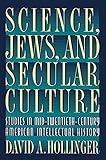Science, Jews, and Secular Culture : Studies in Mid-Twentieth-Century American Intellectual History / David A. Hollinger.
Material type: TextPublisher: Princeton, NJ : Princeton University Press, [2021]Copyright date: ©1996Description: 1 online resource (190 p.)Content type:
TextPublisher: Princeton, NJ : Princeton University Press, [2021]Copyright date: ©1996Description: 1 online resource (190 p.)Content type: - 9781400847747
- Jews -- United States -- Intellectual life
- Science -- United States -- 20th century -- History
- Secularism -- United States -- History -- 20th century
- HISTORY / United States / 20th Century
- Academic freedom, disputes over
- African-Americans
- Anderson, Sherwood
- Anti-Semitism
- Asian-Americans
- Benedict, Ruth
- Blumenberg, Hans
- Boulding, Kenneth
- Bush, Vannevar
- Catholics and Catholicism
- Coffin, Henry Sloan
- Cook, William W
- Cosmopolitanism
- Cowley, Malcolm
- Davis, Chandler
- De-Christianization
- Dos Passos, John
- Edel, Abraham
- Enlightenment, traditions of
- Ethical Culture Society
- Fairchild, Harold Pratt
- Feminism
- Foucault, Michel
- Frankfurter, Felix
- Gadamer, Hans-Georg
- Haber, William
- Herskovitz, Melville
- Hiss, Alger
- Hook, Sidney
- Immigration
- Irvine, James
- Judaism
- Kaempffert, Waldemar
- Klein, Lawrence
- Lazarsfeld, Paul
- Lippmann, Walter
- Markert, Clement
- Miller, Warren
- Nashville Agrarians
- National Science Foundation
- Noyes, Alfred
- Pluralism, academic
- Pragmatism
- Price, Derek
- Reichenbach, Hans
- Schleiermacher, Freidrich
- Shils, Edward
- Spingarn, Joel
- Terman, Lewis
- Tyndall, John
- Universalism
- Vetter, Jan
- 305.552 21
- E184.J5 H646 1996
- online - DeGruyter
| Item type | Current library | Call number | URL | Status | Notes | Barcode | |
|---|---|---|---|---|---|---|---|
 eBook
eBook
|
Biblioteca "Angelicum" Pont. Univ. S.Tommaso d'Aquino Nuvola online | online - DeGruyter (Browse shelf(Opens below)) | Online access | Not for loan (Accesso limitato) | Accesso per gli utenti autorizzati / Access for authorized users | (dgr)9781400847747 |
Frontmatter -- Contents -- Preface -- CHAPTER ONE Introduction -- CHAPTER TWO Jewish Intellectuals and the De-Christianization of American Public Culture in the Twentieth Century -- CHAPTER THREE The "Tough-Minded" Justice Holmes, Jewish Intellectuals, and the Making of an American Icon -- CHAPTER FOUR Two NYUs and "The Obligation of Universities to the Social Order" in the Great Depression -- CHAPTER FIVE The Defense of Democracy and Robert K. Merton's Formulation of the Scientific Ethos -- CHAPTER SIX Free Enterprise and Free Inquiry: The Emergence of Laissez-Faire Communitarianism in the Ideology of Science in the United States -- CHAPTER SEVEN Academic Culture at the University of Michigan, 1938-1988 -- CHAPTER EIGHT Science as a Weapon in Kulturkampfe in the United States during and after World War II -- Index
restricted access online access with authorization star
http://purl.org/coar/access_right/c_16ec
This remarkable group of essays describes the "culture wars" that consolidated a new, secular ethos in mid-twentieth-century American academia and generated the fresh energies needed for a wide range of scientific and cultural enterprises. Focusing on the decades from the 1930s through the 1960s, David Hollinger discusses the scientists, social scientists, philosophers, and historians who fought the Christian biases that had kept Jews from fully participating in American intellectual life. Today social critics take for granted the comparatively open outlook developed by these men (and men they were, mostly), and charge that their cosmopolitanism was not sufficiently multicultural. Yet Hollinger shows that the liberal cosmopolitans of the mid-century generation defined themselves against the realities of their own time: McCarthyism, Nazi and Communist doctrines, a legacy of anti-Semitic "as, and both Protestant and Catholic versions of the notion of a "Christian America." The victory of liberal cosmopolitans was so sweeping by the 1960s that it has become easy to forget the strength of the enemies they fought.Most books addressing the emergence of Jewish intellectuals celebrate an illustrious cohort of literary figures based in New York City. But the pieces collected here explore the long-postponed acceptance of Jewish immigrants in a variety of settings, especially the social science and humanities faculties of major universities scattered across the country. Hollinger acknowledges the limited, rather parochial sense of "mankind" that informed some mid-century thinking, but he also inspires in the reader an appreciation for the integrationist aspirations of a society truly striving toward equality. His cast of characters includes Vannevar Bush, James B. Conant, Richard Hofstadter, Robert K. Merton, Lionel Trilling, and J. Robert Oppenheimer.
Mode of access: Internet via World Wide Web.
In English.
Description based on online resource; title from PDF title page (publisher's Web site, viewed 30. Aug 2021)


